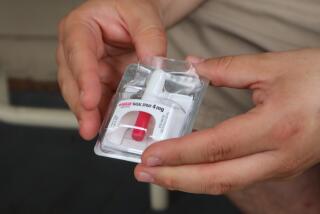Bill Would Expand Psychologists’ Rights : Medicine: The Senate is considering legislation that would allow psychologists to prescribe drugs. But not everyone favors the idea.
- Share via
The California Psychological Assn. recently won legislative support for its effort to win rights to prescribe medicines for mental illness, a privilege generally reserved for psychiatrists and other medical doctors.
Citing a shortage in access to mental health care for the more than 3.5 million Californians with major mental disorders, Senate Democratic Caucus Chairman Richard Polanco (D-Los Angeles) last month introduced Senate Bill 777. It calls for the state Board of Psychology to establish and administer certification to grant licensed psychologists prescriptive authority.
*
According to proponents of the bill, the move would reduce mental health costs and improve services, especially in underserved rural and low-income areas.
In addition, prescriptive rights for psychologists would improve care for the elderly, many of whom are inappropriately medicated by general physicians, who have an average of only three months of training in mental health, according to the bill.
This latest coup in the ongoing turf war between psychologists and psychiatrists was hailed by a cross-fire of press releases issued by the California Psychological Assn. and the California Psychiatric Assn.
According to the California Psychological Assn., non-psychiatrist physicians prescribe more than 80% of mental health medications, but “no health professional has more advanced training (typically, seven years of doctoral training in clinical psychology) in the treatment of persons with mental and emotional disorders than clinical psychologists.”
The psychological group also notes that there has been a 40% decline in medical school graduates choosing psychiatry as a specialty, creating a crisis in meeting the need for properly trained prescribers.
The California Psychiatric Assn. and the American Psychiatric Assn., on the other hand, voiced strong opposition to the Polanco bill, which they say will increase medical costs and create serious medical dangers for patients.
The American Assn. of Applied and Preventive Psychology is also officially opposed to the bill.
“That psychologists continue to seek a physician’s prescribing authority is best understood as an effort . . . to become physicians through legislative fiat rather than through the four rigorous years of medical school education and four more years of supervised residency training,” said Dr. Melvin Sabshin, president of the American Psychiatric Assn.
*
Russ Newman, executive director for professional practice at the American Psychological Assn., said that although his organization does not yet have an official policy on the matter (not all members are in favor, he said), it is forming a task force to determine what kind of training would be needed to give clinical psychologists what they need to safely use psychotropic medicines.
Newman estimated the training would be somewhere between 100 hours and two years for psychologists who want to prescribe drugs.
“California is a very, very important jurisdiction for growth process and evolution,” he said.
Currently, except for pilot projects, psychologists are barred from prescribing in every state.
But if the California legislation is successful, it wouldn’t be the first time health providers other than medical doctors have won prescriptive authority.
Podiatrists and dentists can prescribe drugs in all 50 states, and optometrists and nurses are gaining ground.
More to Read
Sign up for Essential California
The most important California stories and recommendations in your inbox every morning.
You may occasionally receive promotional content from the Los Angeles Times.













